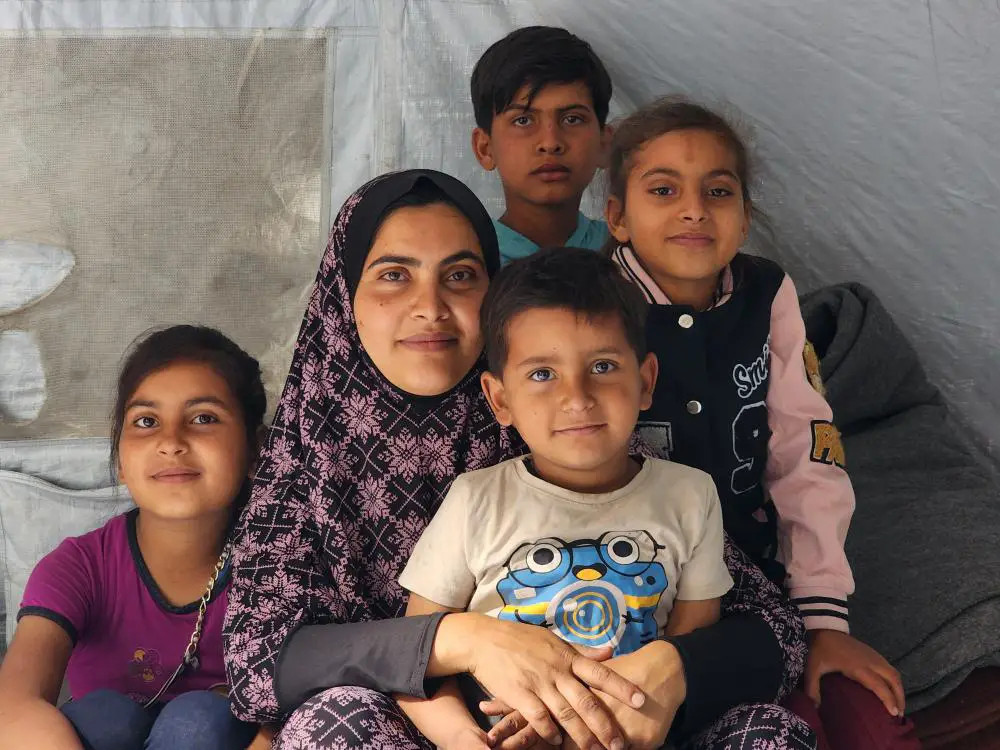Every day, Ibtisam Ghalia and her four children count their remaining stocks of food. These are meagre: a kilo or so of beans, a bag of lentils, a little salt, some herbs, spices, and enough flour for half a dozen flatbreads cooked on a griddle over a fire of wood splinters, waste plastic and cardboard.
In the two months since Israel imposed a total blockade on Gaza, stopping food, medicine, fuel and anything else from entering the devastated territory, Ghalia’s “cupboard” has slowly diminished.
There have been better days, when Ghalia has received a cash distribution from an NGO and has been able to buy fresh vegetables or fruit on the market, or been given a kilogram of flour by a relative or friend.
But prices have risen steadily as the blockade has gone on and basic foodstuffs become scarcer. Sugar that once cost a dollar a kilo now costs 20 times that. A sack of old, poor-quality flour costs far more money than Ghalia can muster. The bakeries run by the World Food Programme shut down weeks ago, all out of flour or fuel. The kitchens that hand out nearly 1 million meals every day in Gaza have limited supplies left. The warehouses of the UN are empty. The family has not eaten meat or dairy products for months.
“We are trying as much as possible to stretch our food since the crossings closed … We now eat just one or two meals a day. I divide the bread among my children just to curb their hunger. I try to eat less so there’s enough for them,” Ghalia said.
Every day since the ceasefire definitively collapsed six weeks ago, the sound of airstrikes and shelling has been clearly audible in the small tented encampment in farmland near the devastated town of Beit Lahia where Ghalia and her family have pitched their tent.
This terrifies her. In December 2023, her husband, Hamza, was killed in an Israeli drone strike along with an uncle and a cousin as they searched for food in the ruins of their former home.
“I didn’t scream or fall apart when I found them. I thanked God that I was able to find and bury them. The hospital refused to receive or shroud them, saying they were already decomposing and there were no burial shrouds. So we wrapped them in blankets and buried them ourselves,” Ghalia, 32, remembered.
“My children cried every day, asking to see their father. The older two [now 10 and nine] wept constantly, wanting to see him again. I kept comforting them, saying we’ll reunite with him in heaven.”
Last week, Ghalia’s sister was hit in the leg by a stray bullet while she was cooking beside the tent.
Every day her eldest son, 10-year-old Hossam, heads out into the surrounding wasteland to search for firewood. There is no other fuel, with no cooking gas available and benzene supplies so low that two-thirds of Gaza’s remaining battered fleet of ambulances have been immobilised and only a third of generators in the territory are working.
“If he is just a little late coming back, I panic. I cannot lose a son as well as my husband. But we have to cook somehow so I have to send him off. He is only 10 but like an adult now with all his duties and worries.”
Her daughter Jinan, 9, has recurrent nightmares about explosions and scattered body parts.
“I miss my old life so much. I miss my father – his voice and his smell. He used to take us for kebabs at the weekend. Now, there’s nothing to buy in the markets. Water we get from the nearby school or from water trucks that come to the camp. My older brother and I carry it to our tent,” she said.
“I miss school so much. My mother told me that when I grow up, I will become a teacher because I love learning, and I hope I succeed in that … All I fear now is losing one of my siblings. I have nightmares in which I see people being killed, and lots of blood.”
About 10,000 cases of acute malnutrition among children have been identified across Gaza, including 1,600 cases of severe acute malnutrition, since the start of 2025, the UN said in a report last week.
Amjad Shawa, director of the Palestinian NGOs Network in Gaza, said the humanitarian system in the territory was collapsing.
“We just have a few days of supplies left. Each day is worse than the one before,” Shawa said.
Israeli officials justify the blockade on Gaza with claims that Hamas routinely steals aid, distributing it to its fighters or selling it to raise vital funds. Aid officials in Gaza deny any widespread theft of aid in recent months, though say looting is on the increase since hostilities recommenced “due to the desperate humanitarian situation”.
The war in Gaza was triggered by a surprise attack launched by Hamas into Israel in October 2023, in which militants killed more than 1,200 people, mostly civilians, and took 250 hostages. Israeli officials say one aim of the blockade is to pressure Hamas to release the 59 hostages who remain in Gaza, more than half of whom are thought to be dead.
According to the ministry of health in Gaza, between 22 and 30 April, 437 Palestinians were killed and 1,023 were injured. In all, 52,400 Palestinians, mostly civilians, have been killed in the war, including more than 2,300 since Israel renewed its offensive in mid-March after reneging on a promise to move to a second phase of the fragile ceasefire which came into force in January.
“We just want to live in safety. We want the fear to end, the war to stop, life to return to how it used to be. We want our homes back,” Ghalia said, then turned back to counting her dwindling supplies. On Friday, her flour will run out, leaving just the beans and the packet of lentils.


